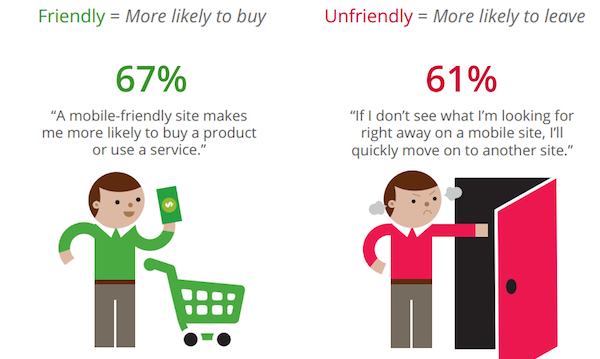Most internet traffic is mobile and a lot of mobile traffic is healthcare related – up to 80% of all internet users are searching for healthcare information.
If you’re wondering if you really need a mobile website for your medical practice, keep these important facts in mind about your patient’s mobile use:
- Mobile web traffic overtook desktop and laptop traffic in 2014
- Consumers spend 3 hours or more each day on their mobile devices
- A Pew Research Center’s 2015 study on US smartphone use reported that 19% of Americans rely on their mobile devices to access online services because they lack other reliable means of going online.
In relation to the Pew Research Study mentioned above, that means that almost 1 out of every 5 American internet users is using their phone exclusively for access.
If you don’t account for patients using mobile devices then you’re just making it harder for them to find you.
Your patients are online looking for answers to their medical questions and searching for providers so, targeting mobile users is an important strategy to make it easier for patients to find you, which makes your practice more patient friendly, and that will make you more profitable.
The Surge of Medical Mobile Apps Usage
Heather Mack of MobiHealthNews reported that in one survey of smartphone users 58% of them used “their phone to communicate with a medical professional” and nearly 50% of respondents “have a fitness, health or medication-tracking app.”
We’re not suggesting that you create your own mobile app, we’re just driving the point home of how much patients rely on their mobile devices.
In Rick Broid’s CNET article, I hired an online dermatologist. Here’s what happened, explains that “there are numerous apps that can pair you with a dermatologist for a virtual consultation — usually powered by the camera in your phone.”
You can see an example in this screenshot by Broida:
Use of these types of mobile services is growing and patients are getting used to the ease and convenience of them. If your standard website isn’t mobile friendly, just think how far behind you’ll be from you competitors who are embracing this mobile reality.
Mobile is Not Just a Requirement for eCommerce Sites
Back in 2013 mobile surpassed PCs for online shopping. But it’s not just shopping that they’re using mobile devices for.
Mobile is what people expect for everything, including patients and their medical needs.
A quality mobile user experience is positive reinforcement for users, evidenced by this Google research:
Additionally, it was found that 74% of visitors were more likely to return to mobile friendly websites.
Ultimately, whether you have an eCommerce store or not, if your site isn’t mobile-friendly you will lose business.
Google May Penalize You – Mobile Website Can Help Organic Search Rankings
One of the reasons that you put so much effort into your website and online reputation is so that your site ranks higher than your competition.
Another wrinkle that affects your overall search ranking is having a mobile website.
Brendan McMahon of Social Fire Media in his post, Google to Penalize Non Mobile Friendly Websites, shared the news that Google was rolling out ranking changes that “that address sites that are misconfigured for smartphone users” in an effort to improve the mobile search experience.
McMahon predicts that:
In the next five years, if you don’t have a mobile website, consider yourself in the dinosaur age. With smartphone users checking their phones 150 times a day, sites without a mobile UI will be left in the dust.
He wrote that in 2013 and the mobile trend has not slowed down.
Google wants a great user experience on every platform so in short, having a mobile friendly website is necessary, it will have an affect on your organic search results.
How To Make Your Healthcare Practice Website Mobile Friendly
Making your healthcare practice website mobile friendly will ensure that there’s no zooming, pinching or scrolling – that means no frustrated patients trying to use your website on their mobile device.
A mobile friendly website offers easy visibility and navigation on a smaller screen.
Standard websites don’t display well on mobile phones and will look distorted on mobile displays. It’s likely that your mobile site will highlight just the essential features with links to secondary information pages.
Mobile users are very important but that doesn’t mean you have to ignore desktop and laptop users, there are still a lot of them. Instead want you want to do is opt for a responsive website. Responsive websites recognize the device being used whether it’s a laptop, PC, tablet, or smartphone and the site resizes itself will resize itself with an optimized view.
Click to Call At the Bare Minimum
Since more people are looking for doctors and landing on your site searching from their smartphones than on their laptop or desktop computers there is one feature that you need, at the bare minimum.
You don’t have to a dedicated app or fancy feature but you do need click to call because 70% of mobile searchers end up calling a business directly from their mobile device.
A great doctor’s office website will get great prospective patients to your site, but they won’t want to stop there. They’ll want to call in, and they will if you make it easy.
You want your click to call link to be prominently placed, just like any call to action, and designed in a way that draws attention and makes it easy to find.
Let’s Recap
Verisign one of the leaders in domain names and internet security perfectly summarizes the need for a mobile friendly, responsive website design:
- There are more mobile connections than people on this planet
- Consumers prefer using their mobile devices over desktops
- Worldwide shipments of PCs continue to decline
- Your business’s website should be mobile-friendly today to stay competitive tomorrow
Mobile friendly sites aren’t a fad, it’s what users are expecting now from any business. A responsive website design creates a better user experience for mobile users which will lead to higher conversions/greater patient acquisition rates, it reinforces your brand/practice as being modern and patient friendly, and it’s good for SEO because the top search engines prefer responsive sites.
Get in touch with InboundMD today for help with your responsive, mobile friendly healthcare practice website.








